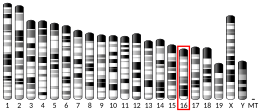(Redirected from VGLL3 )
Protein-coding gene in the species Homo sapiens
Vestigial-like family member 3 is a protein that in humans is encoded by the VGLL3 gene .
This protein is one of four mammalian homologs (VGLL1-4) of the vestigial gene found in the fruit fly Drosophila transcription coregulator by binding to TEA domain (TEAD) transcription factors (TEAD1 , TEAD2 , TEAD3 , TEAD4 ) through its TDU motif. VGLL3 has been implicated in various biological processes including myogenesis (formation of muscle tissue), cell proliferation , and cancer progression . VGLL3 can also promote epithelial-to-mesenchymal transition (EMT) and cell motility in certain cancer types, suggesting it may play a role in tumor development and metastasis .
See also
References
^ GRCh38: Ensembl release 89: ENSG00000206538 – Ensembl , May 2017
^ GRCm38: Ensembl release 89: ENSMUSG00000091243 – Ensembl , May 2017
"Human PubMed Reference:" . National Center for Biotechnology Information, U.S. National Library of Medicine ."Mouse PubMed Reference:" . National Center for Biotechnology Information, U.S. National Library of Medicine ."Entrez Gene: Vestigial-like family member 3" .^ Yamaguchi N (2020). "Multiple Roles of Vestigial-Like Family Members in Tumor Development" . Frontiers in Oncology . 10 : 1266. doi :10.3389/fonc.2020.01266 . PMC 7393262 . PMID 32793503 .
^ Hori N, Takakura Y, Sugino A, Iwasawa S, Nomizo K, Yamaguchi N, et al. (May 2022). "Vestigial-like family member 3 stimulates cell motility by inducing high-mobility group AT-hook 2 expression in cancer cells" . Journal of Cellular and Molecular Medicine . 26 (9): 2686–2697. doi :10.1111/jcmm.17279 . PMC 9077286 . PMID 35366053 .
Further reading
Tao S, Wang Z, Feng J, Hsu FC, Jin G, Kim ST, et al. (March 2012). "A genome-wide search for loci interacting with known prostate cancer risk-associated genetic variants" . Carcinogenesis . 33 (3): 598–603. doi :10.1093/carcin/bgr316 . PMC 3291863 . PMID 22219177 . Gambaro K, Quinn MC, Wojnarowicz PM, Arcand SL, de Ladurantaye M, Barrès V, et al. (June 2013). "VGLL3 expression is associated with a tumor suppressor phenotype in epithelial ovarian cancer" . Molecular Oncology . 7 (3): 513–30. doi :10.1016/j.molonc.2012.12.006 . PMC 5528482 . PMID 23415753 . Zhou W, Chen H, Zhang L (March 2009). "The PcG protein hPc2 interacts with the N-terminus of histone demethylase JARID1B and acts as a transcriptional co-repressor" (PDF). BMB Reports . 42 (3): 154–9. doi :10.5483/bmbrep.2009.42.3.154 . PMID 19336002 . Halperin DS, Pan C, Lusis AJ, Tontonoz P (February 2013). "Vestigial-like 3 is an inhibitor of adipocyte differentiation" . Journal of Lipid Research . 54 (2): 473–81. doi :10.1194/jlr.M032755 . PMC 3541706 . PMID 23152581 . Hélias-Rodzewicz Z, Pérot G, Chibon F, Ferreira C, Lagarde P, Terrier P, et al. (December 2010). "YAP1 and VGLL3, encoding two cofactors of TEAD transcription factors, are amplified and overexpressed in a subset of soft tissue sarcomas". Genes, Chromosomes & Cancer . 49 (12): 1161–71. doi :10.1002/gcc.20825 . PMID 20842732 . S2CID 205828045 . Wang L, Lu W, Chen YG, Zhou XM, Gu JR (December 1999). "Comparison of gene expression between normal colon mucosa and colon carcinoma by means of messenger RNA differential display" . World Journal of Gastroenterology . 5 (6): 533–534. doi :10.3748/wjg.v5.i6.533 . PMC 4688801 . PMID 11819507 . Maeda T, Chapman DL, Stewart AF (December 2002). "Mammalian vestigial-like 2, a cofactor of TEF-1 and MEF2 transcription factors that promotes skeletal muscle differentiation" . The Journal of Biological Chemistry . 277 (50): 48889–98. doi :10.1074/jbc.M206858200 . PMID 12376544 .
Categories :
Text is available under the Creative Commons Attribution-ShareAlike License. Additional terms may apply.
**DISCLAIMER** We are not affiliated with Wikipedia, and Cloudflare.
The information presented on this site is for general informational purposes only and does not constitute medical advice.
You should always have a personal consultation with a healthcare professional before making changes to your diet, medication, or exercise routine.
AI helps with the correspondence in our chat.
We participate in an affiliate program. If you buy something through a link, we may earn a commission 💕
↑



